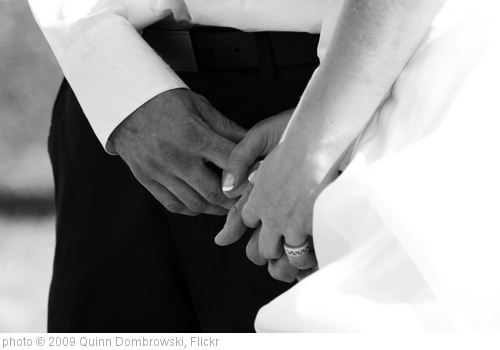Submission as Weakness
Erik and I are coming up on our 8 year anniversary and lately I've been reflecting on our early days together. When we were engaged, we spent a lot of time talking and praying about our marriage. Much of this time was focused on our personality differences. I am a natural leader—strong, opinionated, capable and confident. Erik is not a natural leader. He is non-confrontational, servant-hearted, gentle and laid-back.
But we believe he is to be the leader in our home, which means he is being forced to do something counter-intuitive. In taking on the role of leading our family, he is repeatedly shoved out of his natural realm of comfort. I, also, am being forced to do something counter-intuitive. In taking on the role of submissive wife, I am continually repressing what comes naturally to me. (Okay, not always. But sometimes.)
It would make much more sense for us to have a marriage in which there is no set hierarchy or structure. Erik would find fulfillment in exercising his gifts without being forced to do something he finds so difficult. I would find fulfillment in exercising my natural leadership. We would be fulfilled in our work for the Lord.
And if we were called to a life of personal fulfillment, that would make sense. But that’s not what we’re called to. We follow Christ, who told His disciples to set aside their personal ambitions to serve one another, just as even He “came not to be served, but to serve and to give His life as a ransom for many” (Mark 10:45).
Through His life and death, Christ has taught us life is not about self-fulfillment or our rights. And it isn’t even about what I can offer Him. We see this in Philippians 2 as He did not insist on holding onto His full rights as God, but submitted Himself to the will of His Father and became a humble human.
Rather than self-fulfillment, our lives are meant for the glory of God. And trusting a sovereign God means trusting His plan for our marriage—the good design He laid out from the beginning as a foreshadowing of Christ’s relationship with the church.
Now this does not mean I don’t believe in equality. Erik and I are equal in Christ. We have been given the same gift of salvation. I do not hold a lower position in the Kingdom; nor does he hold a higher one. But equality of standing does not require identical roles of service.
What it comes down to for us is this: it would be far easier to do it another way. Erik would not have to lead if he didn’t want to. I would not have to repress leadership if I didn’t want to.
And yet as we look back on our marriage, it is clear to us both that we are more dependent on Christ because of the structure of our marriage. Erik must depend on Christ to lead our home. I must depend on Him to not demand my way or take control.
This dependence is far sweeter than I could have imagined. It is possible only because Jesus Christ came, lived a perfect life, died in submission to the Father, and was raised again. It is possible because He has proven Himself good and trustworthy. It is possible because He showed how strength is made perfect in weakness.
Therefore, I can be weak and set aside my desire to lead and control, or even to have equal say in all decisions. I can do this because I know strength does not come from me anyway. Real strength comes from abiding in Christ through my weakness.
So I depend on Christ as I submit to my husband. This dependence causes me to stop and pray before speaking. It allows me to rest. It causes me to rejoice at answered prayers. It draws me to Him for comfort when things are not as I wish them to be. And the same One who loves and strengthens me does the same for my husband. What sweet fellowship we have, knowing we are both relying on He who is far greater and more capable than ourselves!
This is not everyone's story, nor is our marriage perfect. It's simply my testimony of the way in which God has used my marriage to show me my weakness and His sufficiency. I pray it encourages you today to see Him as sufficient as well.
